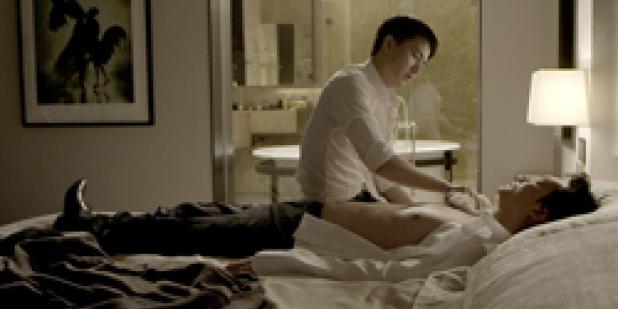Join us for a free one-day workshop for educators at the Japanese American National Museum, hosted by the USC U.S.-China Institute and the National Consortium for Teaching about Asia. This workshop will include a guided tour of the beloved exhibition Common Ground: The Heart of Community, slated to close permanently in January 2025. Following the tour, learn strategies for engaging students in the primary source artifacts, images, and documents found in JANM’s vast collection and discover classroom-ready resources to support teaching and learning about the Japanese American experience.
I Love You, Boss 老板, 我爱你
The UCLA International Institute presents the film, "I Love You, Boss," as part of their 2014 China Onscreen Biennial: Spectrum.
Where

Spectrum
North American Premiere 2014
Director: Zhang Yuan
Producer: David Cao, Sonic Yao
Screenwriter: Fan Jinwei
Cinematographer: Zhang Jian
Production Designer:
Cast: Li Quan, Lv Yulai, Li Xinyun
DCP, color, 27 min.
As in his epoch-making film, East Palace West Palace (1996), Sixth Generation luminary Zhang Yuan explores same-sex attraction within the context of power relationships in contemporary China (this time as part of the portmanteau Hong Kong International Film Festival production, Beautiful (2014). While the earlier film bound a hapless citizen to a ruthless and seductive power (“the prisoner loves her jailer”), in I Love You, Boss, oppression stems from the socio-economic inequality that leaves the disenfranchised pining for what they cannot have, as incisively explored in Zhang’s earlier feature, Beijing Flickers (2012). A young chauffeur (Lv Yulai) finds himself attracted to his contemptuous and callous boss (Li Quan) – without a single word being exchanged between the two men. – Berenice Reynaud
A 1989 graduate of the Beijing Film Academy, Zhang Yuan directed Mama (1999), a combination of documentary and fiction, film and video that was the first Chinese independent feature since 1949 and that is credited with launching the “Sixth Generation” as well as the “Urban Generation.” Zhang made a number of “underground” films, often inspired by local countercultural movements, such as the indie rock scene (Beijing Bastards, 1993; Sons, 1996) or the gay subculture. Starting with Seventeen Years (1999), he made a number of successful features “aboveground.” His most recent feature Beijing Flickers was featured along with a companion pop-up photography exhibition during the 2012 COB.
Followed by:
The Night
Featured Articles
Please join us for the Grad Mixer! Hosted by USC Annenberg Office of International Affairs, Enjoy food, drink and conversation with fellow students across USC Annenberg. Graduate students from any field are welcome to join, so it is a great opportunity to meet fellow students with IR/foreign policy-related research topics and interests.
RSVP link: https://forms.gle/1zer188RE9dCS6Ho6
Events
Hosted by USC Annenberg Office of International Affairs, enjoy food, drink and conversation with fellow international students.
Join us for an in-person conversation on Thursday, November 7th at 4pm with author David M. Lampton as he discusses his new book, Living U.S.-China Relations: From Cold War to Cold War. The book examines the history of U.S.-China relations across eight U.S. presidential administrations.




